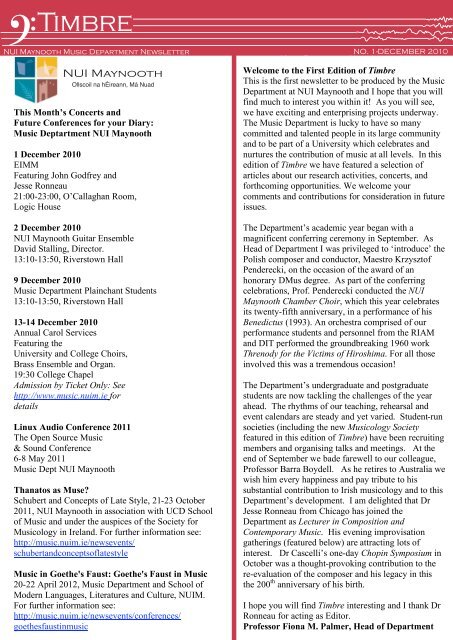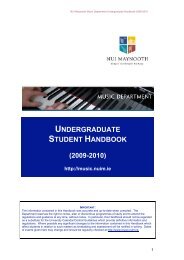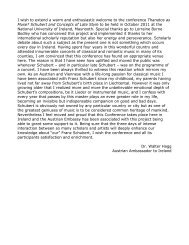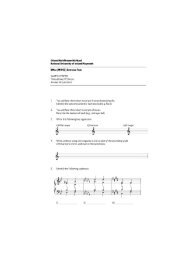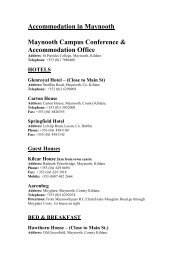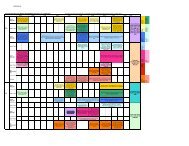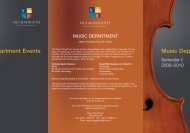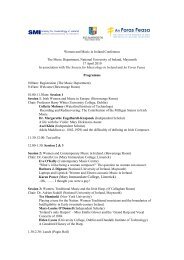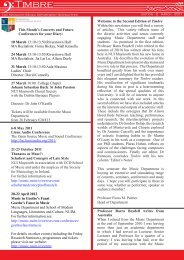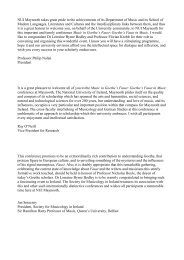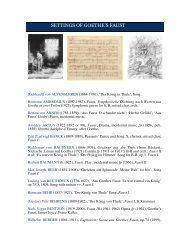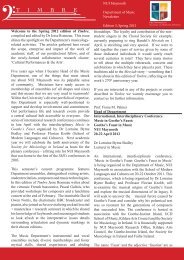Timbre December 2010 - Music - National University of Ireland ...
Timbre December 2010 - Music - National University of Ireland ...
Timbre December 2010 - Music - National University of Ireland ...
You also want an ePaper? Increase the reach of your titles
YUMPU automatically turns print PDFs into web optimized ePapers that Google loves.
? <strong>Timbre</strong><br />
NUI Maynooth <strong>Music</strong> Department Newsletter NO. 1-DECEMBER <strong>2010</strong><br />
<strong>Music</strong> Department News Letter, NUI Maynooth<br />
NUI Maynooth<br />
Ollscoil na hÉireann, Má Nuad<br />
This Month’s Concerts and<br />
Future Conferences for your Diary:<br />
<strong>Music</strong> Deptartment NUI Maynooth<br />
1 <strong>December</strong> <strong>2010</strong><br />
EIMM<br />
Featuring John Godfrey and<br />
Jesse Ronneau<br />
21:00-23:00, O’Callaghan Room,<br />
Logic House<br />
2 <strong>December</strong> <strong>2010</strong><br />
NUI Maynooth Guitar Ensemble<br />
David Stalling, Director.<br />
13:10-13:50, Riverstown Hall<br />
9 <strong>December</strong> <strong>2010</strong><br />
<strong>Music</strong> Department Plainchant Students<br />
13:10-13:50, Riverstown Hall<br />
13-14 <strong>December</strong> <strong>2010</strong><br />
Annual Carol Services<br />
Featuring the<br />
<strong>University</strong> and College Choirs,<br />
Brass Ensemble and Organ.<br />
19:30 College Chapel<br />
Admission by Ticket Only: See<br />
http://www.music.nuim.ie for<br />
details<br />
Linux Audio Conference 2011<br />
The Open Source <strong>Music</strong><br />
& Sound Conference<br />
6-8 May 2011<br />
<strong>Music</strong> Dept NUI Maynooth<br />
Thanatos as Muse?<br />
Schubert and Concepts <strong>of</strong> Late Style, 21-23 October<br />
2011, NUI Maynooth in association with UCD School<br />
<strong>of</strong> <strong>Music</strong> and under the auspices <strong>of</strong> the Society for<br />
<strong>Music</strong>ology in <strong>Ireland</strong>. For further information see:<br />
http://music.nuim.ie/newsevents/<br />
schubertandconcepts<strong>of</strong>latestyle<br />
<strong>Music</strong> in Goethe's Faust: Goethe's Faust in <strong>Music</strong><br />
20-22 April 2012, <strong>Music</strong> Department and School <strong>of</strong><br />
Modern Languages, Literatures and Culture, NUIM.<br />
For further information see:<br />
http://music.nuim.ie/newsevents/conferences/<br />
goethesfaustinmusic<br />
Welcome to the First Edition <strong>of</strong> <strong>Timbre</strong><br />
This is the first newsletter to be produced by the <strong>Music</strong><br />
Department at NUI Maynooth and I hope that you will<br />
find much to interest you within it! As you will see,<br />
we have exciting and enterprising projects underway.<br />
The <strong>Music</strong> Department is lucky to have so many<br />
committed and talented people in its large community<br />
and to be part <strong>of</strong> a <strong>University</strong> which celebrates and<br />
nurtures the contribution <strong>of</strong> music at all levels. In this<br />
edition <strong>of</strong> <strong>Timbre</strong> we have featured a selection <strong>of</strong><br />
articles about our research activities, concerts, and<br />
forthcoming opportunities. We welcome your<br />
comments and contributions for consideration in future<br />
issues.<br />
The Department’s academic year began with a<br />
magnificent conferring ceremony in September. As<br />
Head <strong>of</strong> Department I was privileged to ‘introduce’ the<br />
Polish composer and conductor, Maestro Krzyszt<strong>of</strong><br />
Penderecki, on the occasion <strong>of</strong> the award <strong>of</strong> an<br />
honorary DMus degree. As part <strong>of</strong> the conferring<br />
celebrations, Pr<strong>of</strong>. Penderecki conducted the NUI<br />
Maynooth Chamber Choir, which this year celebrates<br />
its twenty-fifth anniversary, in a performance <strong>of</strong> his<br />
Benedictus (1993). An orchestra comprised <strong>of</strong> our<br />
performance students and personnel from the RIAM<br />
and DIT performed the groundbreaking 1960 work<br />
Threnody for the Victims <strong>of</strong> Hiroshima. For all those<br />
involved this was a tremendous occasion!<br />
The Department’s undergraduate and postgraduate<br />
students are now tackling the challenges <strong>of</strong> the year<br />
ahead. The rhythms <strong>of</strong> our teaching, rehearsal and<br />
event calendars are steady and yet varied. Student-run<br />
societies (including the new <strong>Music</strong>ology Society<br />
featured in this edition <strong>of</strong> <strong>Timbre</strong>) have been recruiting<br />
members and organising talks and meetings. At the<br />
end <strong>of</strong> September we bade farewell to our colleague,<br />
Pr<strong>of</strong>essor Barra Boydell. As he retires to Australia we<br />
wish him every happiness and pay tribute to his<br />
substantial contribution to Irish musicology and to this<br />
Department’s development. I am delighted that Dr<br />
Jesse Ronneau from Chicago has joined the<br />
Department as Lecturer in Composition and<br />
Contemporary <strong>Music</strong>. His evening improvisation<br />
gatherings (featured below) are attracting lots <strong>of</strong><br />
interest. Dr Cascelli’s one-day Chopin Symposium in<br />
October was a thought-provoking contribution to the<br />
re-evaluation <strong>of</strong> the composer and his legacy in this<br />
the 200 th anniversary <strong>of</strong> his birth.<br />
I hope you will find <strong>Timbre</strong> interesting and I thank Dr<br />
Ronneau for acting as Editor.<br />
Pr<strong>of</strong>essor Fiona M. Palmer, Head <strong>of</strong> Department
<strong>Timbre</strong> <strong>Music</strong> Department NUI Maynooth<br />
Bernadette Dunphy (3BMus)<br />
The <strong>Music</strong> Department at NUI Maynooth is<br />
renowned for its proud history, achievements and<br />
expertise in the field <strong>of</strong> musicology. Paired with<br />
the encouraging atmosphere cultivated by the<br />
approachable nature <strong>of</strong> all staff members this created a<br />
perfect environment for the emergence <strong>of</strong> one <strong>of</strong><br />
<strong>Ireland</strong>'s first student –run musicology societies.<br />
Maynooth <strong>Music</strong>ology Society was established in<br />
August <strong>2010</strong>. Its primary aim is to promote<br />
musicology as a live, approachable and<br />
exciting discipline within the <strong>University</strong>. It further<br />
seeks to provide a platform for students to discuss<br />
musicological issues and topics in a relaxed, informal<br />
way and to foster links between Maynooth<br />
and other universities in creating an undergraduate<br />
musicology community promoting active discourse<br />
between its members.<br />
Since the Society’s establishment and ratification by<br />
Maynooth's Student Union many exiting events have<br />
taken place. Notable among these was the Society's<br />
trip to Queen's <strong>University</strong> Belfast in order to attend the<br />
seminar <strong>of</strong> Dr Jirí Kopeck", with his paper entitled,<br />
'Zdenek Fibich-Czech Composer between German and<br />
Romanesque Opera Traditions.' This excursion was<br />
assisted greatly by Dr Devine. Primarily, the<br />
Society organises fortnightly discussion forums.<br />
Recent sessions have focused on film as musicology,<br />
(occurring in conjunction with film screenings), and<br />
have considered music’s development in the<br />
last 10 years. The Society hosts an article club in<br />
which recent themes have included modernism, postmodernism<br />
and post-colonialism. The Society also<br />
engages with visiting artists and conducted an open<br />
discussion forum with Mr Charles Marshall on his<br />
experiences with Japanese culture, music and<br />
performing practice.<br />
A debate on the canon and its validity is planned for<br />
<strong>December</strong> and in the future the Society hopes to host a<br />
national undergraduate musicology seminar in<br />
attempt to unite and create a sense <strong>of</strong> community<br />
between undergraduate students in the field<br />
The Society would like to take this opportunity to<br />
thank all staff members for their support in this<br />
endeavour, and in particular Dr Byrne Bodley whose<br />
advice and encouragement has been greatly<br />
appreciated.<br />
For further information on the Society or if you would<br />
like to make any suggestions you can contact<br />
Bernadette Dunphy at musicology@nuimsu.com<br />
visit our website at<br />
http://www.maynoothmusicologysociety.com<br />
become a fan on Facebook<br />
or come along to one <strong>of</strong> our meetings<br />
on Thursdays at 18:00 (O'Callaghan Room,<br />
Logic House).<br />
EIMM<br />
Evenings <strong>of</strong> Improvised <strong>Music</strong>, Maynooth<br />
Dr Jesse Ronneau<br />
EIMM is a near monthly series <strong>of</strong> evenings<br />
showcasing the rich and <strong>of</strong>ten challenging practice <strong>of</strong><br />
experimental improvisation. Each evening features a<br />
guest artist(s) who are experienced in the craft <strong>of</strong><br />
improvisation. More importantly the evenings are<br />
designed to encourage participation from audience<br />
members who may perform themselves.<br />
The benefits <strong>of</strong> improvising are far reaching. It can be<br />
a source <strong>of</strong> stimuli for composers. It can be a chance<br />
to explore different techniques on your instrument. It<br />
can be a chance to hear very strange combinations <strong>of</strong><br />
instruments that probably have not been heard before<br />
(such as turntables, clarinets, laptops, flutes and<br />
banjo—not your typical line up). Improvisation<br />
encourages attentive listening; a crucial skill.<br />
Naturally, Improv helps develop the ability to think on<br />
your feet and think outside the box.<br />
All <strong>of</strong> this occurs in a supportive and relaxed<br />
environment that tends to be simply fun. Of course no<br />
one is forced to play and people who wish to purely<br />
listen are more than welcome.<br />
There have already been two very successful evenings.<br />
The next takes place on 1 <strong>December</strong>. It will feature<br />
composer/performer/improviser John Godfrey on<br />
electric guitar with myself on contrabass. Do come<br />
along for a night <strong>of</strong> new and unusual sounds!
<strong>Timbre</strong> <strong>Music</strong> Department NUI Maynooth<br />
Prestigious <strong>Music</strong> Technology Conference<br />
Coming to NUI Maynooth<br />
Dr Victor Lazzarini<br />
http://lac.linuxaudio.org/2011/<br />
The Linux Audio Conference is an international<br />
conference on Open Source S<strong>of</strong>tware for music, sound<br />
and other media with Linux as the main platform.<br />
Its goals are as follows:<br />
• To bring together developers, musicians, composers<br />
and other users<br />
• To discuss the Linux Audio core system<br />
• To discuss Linux Audio applications<br />
• To discuss Open Source music and sound<br />
applications<br />
• To inform about Open Source S<strong>of</strong>tware for <strong>Music</strong><br />
• To inform about Open Content licences<br />
• To collaborate and exchange information<br />
• To improve the s<strong>of</strong>tware<br />
• To understand the needs <strong>of</strong> users<br />
• To enjoy music and art performances at the<br />
conference<br />
The Linux Audio Conference is an annual<br />
international free-<strong>of</strong>-charge event that is reaching its<br />
eighth year now. This conference has been a meeting<br />
place for many <strong>of</strong> the world leaders in the<br />
development <strong>of</strong> non-proprietary pr<strong>of</strong>essional Audio<br />
Visual s<strong>of</strong>tware. The LAC was the incubating event<br />
for many <strong>of</strong> the well-established Free and Open Source<br />
packages that have made a significant impact on the<br />
area, including the Jack Connection Kit, Ardour and<br />
Qtractor, just to mention a few. Over the years, many<br />
important technologies were demonstrated at the<br />
conference, such as systems for spatial audio (Wave<br />
Field Synthesis, Ambisonics), networked audio and<br />
real-time processing. LAC also featured presentations<br />
by key people involved in Sound Synthesis research<br />
(Csound, Pure Data, SuperCollider, etc.) and<br />
development <strong>of</strong> commercial products (Harrison<br />
Consoles, Indamixx, 64studio, Lionstracs, and<br />
Trinity). It provides plenty <strong>of</strong> space for developer<br />
discussions and - <strong>of</strong> course - concerts and music (<strong>of</strong><br />
various electronic flavours and genres). Recently, the<br />
conference has also been a host to the Open Video<br />
community (lumiera, openmovieeditor, kdenlive,<br />
kino), expanding its range to incorporate visual<br />
technologies.<br />
The conference programme will include talks,<br />
workshops and electronic music concerts. It will be a<br />
great event, not to be missed by anyone in the <strong>Music</strong><br />
Department.<br />
Spotlighting Dr Laura Watson: Research Activities<br />
I am currently engaged in a number <strong>of</strong> individual and<br />
collaborative research projects in the field <strong>of</strong> French<br />
music during the period 1870–1939. As a member <strong>of</strong><br />
the Francophone <strong>Music</strong> Criticism Network, I am<br />
leading the publication <strong>of</strong> a digitized edition titled<br />
‘Paul Dukas: Writings (1892 – 1894)’. The first part <strong>of</strong><br />
the collection (1892), which was prepared with the<br />
assistance <strong>of</strong> former <strong>Music</strong> student Christopher<br />
Corcoran through a SPUR internship, is now available<br />
here: http://music.sas.ac.uk/fmc/collections. Dukas<br />
wrote prolifically on Wagner, Parisian concert life and<br />
new directions in French music, with his muchadmired<br />
early articles for La Revue hebdomadaire<br />
being especially significant. I am collating these texts<br />
for the first time here and the work is due for<br />
completion in late 2011.<br />
The fusion <strong>of</strong> music, text and drama/dance on the stage<br />
was a frequent theme in Dukas’s essays and he<br />
favoured a similar artistic synthesis in his approach to<br />
composition too. Therefore, I am seeking to define,<br />
explore and analyse this music-text-theatre aesthetic<br />
through a large-scale, tw<strong>of</strong>old study <strong>of</strong> the man’s<br />
music criticism and creative œuvre. At the turn <strong>of</strong> the<br />
twentieth century, this story unfolded against the<br />
backdrop <strong>of</strong> Debussy’s landmark opera Pelléas et<br />
Mélisande and just over a decade later Diaghilev’s<br />
Ballets russes set the scene for unprecedented<br />
developments in French ballet. Dukas encountered all<br />
the key players in the Parisian music world and,<br />
watching their innovations with interest, responded to<br />
them via both the public domain (the press) and in<br />
private (sketching opera and ballet drafts).<br />
Finally, I have begun investigating post-World War 1<br />
French opera. Imbued with patriotic sentiment and<br />
intent on change, Satie and Les six sought out the ‘new<br />
spirit’ (l’esprit nouveau) and rejected past political<br />
ideologies. This narrative <strong>of</strong> a post-war shift, however,<br />
overlooks a major subplot <strong>of</strong> 1920s’ French music:<br />
many composers produced works that suggested the<br />
war actually encouraged an entrenchment <strong>of</strong> earlier<br />
views. I am examining a number <strong>of</strong> music dramas<br />
from this decade that document how older national<br />
conflicts between traditionalists and radicals, right and<br />
left, Catholics and Jews all survived well into the<br />
interwar decades—which suggests that cultural<br />
representations <strong>of</strong> the French state were in fact far<br />
more complex than is properly acknowledged.
<strong>Timbre</strong> <strong>Music</strong> Department NUI Maynooth<br />
EMIR<br />
Dr Patrick F Devine<br />
There is no denying that musicology is thriving in<br />
<strong>Ireland</strong> today. This is evinced not only by the number<br />
<strong>of</strong> international conferences held in the country and the<br />
rapid rate <strong>of</strong> scholarly volumes which have seen the<br />
light <strong>of</strong> day in recent years but even in such initiatives<br />
as the annual meetings organised by our postgraduate<br />
music students and the emergence in the last few<br />
weeks <strong>of</strong> an undergraduate musicology society at NUI<br />
Maynooth.<br />
And yet, only twenty years ago, Harry White could<br />
write with a reasonable frustration in the pioneering<br />
first volume <strong>of</strong> Irish <strong>Music</strong>al Studies, <strong>Music</strong>ology in<br />
<strong>Ireland</strong> (1990), that ‘music does not form much (if<br />
any) part <strong>of</strong> the vigorous discourse which preoccupies<br />
thinkers in their assessment <strong>of</strong> the condition <strong>of</strong> being<br />
Irish and <strong>of</strong> <strong>Ireland</strong>’ (page 296). This sentence appears<br />
in a chapter entitled ‘The Case for an Encyclopaedia in<br />
<strong>Ireland</strong>’. Like the proverbial dog with bone he availed<br />
<strong>of</strong> every opportunity to air his vision, so that in volume<br />
4 <strong>of</strong> Irish <strong>Music</strong>al Studies in 1996 there is a reference<br />
to ‘the much vaunted (but as yet unachieved)<br />
encyclopedia [sic] <strong>of</strong> music in <strong>Ireland</strong>’ (pages 11–12).<br />
In the introduction to his own survey <strong>of</strong> music and<br />
cultural history in <strong>Ireland</strong>, The Keeper’s Recital<br />
(1998), he once again argues for ‘a single positivistic<br />
enterprise, namely the production <strong>of</strong> an encyclopaedia<br />
<strong>of</strong> music in <strong>Ireland</strong>’ (page 12).<br />
Within five years the landscape had changed<br />
somewhat for the better. Hope could be elicited from<br />
developments such as the formation <strong>of</strong> the Society for<br />
<strong>Music</strong>ology in <strong>Ireland</strong> and the beginning <strong>of</strong> annual<br />
conferences (the first held here at NUI Maynooth). By<br />
2003 the dream became a reality with the<br />
establishment <strong>of</strong> an editorial board for the project.<br />
Membership <strong>of</strong> the board comprises chairman (Gerard<br />
Gillen), general editors (Barra Boydell and Harry<br />
White), executive administrator (Mark Fitzgerald) and<br />
administrator (Maria McHale). In addition eight<br />
thematic areas were identified, with their respective<br />
subject editors: Ann Buckley (medieval), Gareth Cox<br />
(twentieth-century), Gerard Gillen (sacred catholic),<br />
Kerry Houston (sacred protestant), Maria McHale and<br />
Michael Murphy (nineteenth-century), Mel Mercier<br />
and Méabh Ní Fhuartháin (popular), and Adrian<br />
Scahill (traditional). Patrick Devine assumed the role<br />
<strong>of</strong> style editor. The team began to operate in 2004.<br />
Incidentally the choice <strong>of</strong> the term encyclopaedia was<br />
indicative <strong>of</strong> the preference for a thematic rather than<br />
narrative approach. The acronym EMIR was less a nod<br />
towards the financially lucrative Gulf states than a<br />
phonetic equivalent <strong>of</strong> the instantly recognisable Irish<br />
female name; at least it compared favourably with the<br />
inauspicious alternative DIM (i.e. Dictionary <strong>of</strong> Irish<br />
<strong>Music</strong>)! The fact that the Encyclopaedia <strong>of</strong> <strong>Music</strong> in<br />
<strong>Ireland</strong> is the largest project <strong>of</strong> its kind to have been<br />
undertaken in this country will be attested by the<br />
envisaged publication in 2011 by UCD Press which<br />
will contain two volumes, one million words and 2,500<br />
entries by 250 contributors.<br />
Summer Festivals and Conferences<br />
Dr Jesse Ronneau<br />
As Christmas comes upon us it may seem a bit<br />
premature to begin thinking <strong>of</strong> the quasi-warmth<br />
(hopefully) coming our way in the summer months.<br />
However, now is actually the perfect time to start<br />
investigating, planning and applying for Summer<br />
Festivals and Conferences. Although music<br />
conferences happen year round, it is in summer that<br />
the larger gatherings <strong>of</strong>ten occur.<br />
Obviously, times are tough for everyone financially,<br />
but by thinking about future activities now you can<br />
reap the benefits <strong>of</strong> early planning and budgeting.<br />
With ever-dwindling monetary resources at their<br />
disposal, more and more summer events are requiring<br />
early applications (especially applications requesting<br />
financial assistance) so the winter break is the time to<br />
plan your summer.<br />
The benefits <strong>of</strong> attending festivals are multifold and<br />
long lasting. The most immediate benefit is being<br />
exposed to new and different approaches and vice<br />
versa.<br />
<strong>Music</strong> is very much a high-contact business. Festivals<br />
and conferences are essential opportunities to meet the<br />
leading experts in your field. The long lasting effects<br />
<strong>of</strong> personal contacts can (and almost always do) lead<br />
to future projects and (possibly) employment,<br />
especially in academia. Festivals are also a great way<br />
to demonstrate to future employers or universities (i.e.<br />
post-graduate, post-doctoral work) your level <strong>of</strong><br />
commitment to your field.<br />
Below is a short list <strong>of</strong> <strong>Music</strong> Events/Festivals and<br />
Conferences concerning Contemporary <strong>Music</strong>, which<br />
is my specialism.<br />
• Among the largest New <strong>Music</strong> festivals is the<br />
International Summer Course for New <strong>Music</strong><br />
Darmstadt, held just outside Frankfurt,<br />
Germany. It regularly attracts around 800
<strong>Timbre</strong> <strong>Music</strong> Department NUI Maynooth<br />
participants. The Festival is only held every<br />
two years (every even year). The next one will<br />
be held in 2012. It is a rich and, to be frank,<br />
challenging environment. To be exposed to<br />
numerous cutting edge ideas in composition<br />
and performance can be daunting, but has<br />
proven to be very rewarding to numerous<br />
participants over the past 60 years.Although<br />
historically Darmstadt caters to composers and<br />
performers <strong>of</strong> new music, the Festival has<br />
recently introduced a new commitment to<br />
<strong>Music</strong>ology in Contemporary <strong>Music</strong>.<br />
• Other new music festivals which are more or<br />
less held annually are: June In Buffalo (USA);<br />
SommerAkadamie Schloss Solitude (Stuttgartheld<br />
every odd numbered year); Festival<br />
Acanthes (France); Bang on Can Summer<br />
Festival (USA); highScore Festival (Italy);<br />
Dizzonance (Rome); soundSCAPE festival<br />
(Italy)… just to name a few.<br />
There are other conferences and events in other<br />
disciplines. For information on these you may wish to<br />
contact an appropriate member <strong>of</strong> staff. (It is important<br />
to note that festivals in non-English speaking countries<br />
almost always provide English Translation)<br />
Spotlighting Dr Lorraine Byrne Bodley: Research<br />
Activities<br />
Following the publication <strong>of</strong> her monograph, Goethe<br />
and Zelter: <strong>Music</strong>al Dialogues (Ashgate, <strong>2010</strong>) which<br />
was launched by Pr<strong>of</strong>essor Nicholas Boyle (President<br />
<strong>of</strong> Magdalene College Cambridge) at the Dublin<br />
residence <strong>of</strong> the German Ambassador to <strong>Ireland</strong> on 4<br />
<strong>December</strong> 2009, Dr Lorraine Byrne Bodley took up an<br />
invitation as Visiting Pr<strong>of</strong>essor at the <strong>University</strong> <strong>of</strong><br />
Leipzig which was funded by a DAAD Senior<br />
Academics Award (March to June <strong>2010</strong>). The award<br />
was granted to commence work on Goethe’s<br />
Correspondence with Contemporary Composers: A<br />
Critical Edition, a monograph containing Goethe’s<br />
correspondence with all contemporary composers:<br />
Kayser, Reichardt, Beethoven, Schubert,<br />
Mendelssohn, Maria Szymanowska and Spontini.<br />
During her sabbatical, Dr Byrne Bodley completed an<br />
annotated translation <strong>of</strong> Goethe’s complete<br />
correspondence with Johann Friedrich Reichardt and<br />
will deliver a lecture on her research in the<br />
forthcoming research seminars in the <strong>Music</strong><br />
Department on Friday 2 February 2011 at 15:00.<br />
One <strong>of</strong> the highlights <strong>of</strong> Dr Byrne Bodley’s sabbatical<br />
was the German premiere, a pr<strong>of</strong>essional performance<br />
<strong>of</strong> her edition <strong>of</strong> Proserpina: Goethe’s Melodrama<br />
with <strong>Music</strong> by Carl Eberwein, by the Thüringer<br />
Symphoniker, conducted by Oliver Weder, with Heike<br />
Meyer from the Weimar Theatre as Proserpina, on 5<br />
June <strong>2010</strong> in Heidecksburg Castle, Rudolstadt in<br />
Germany, with a repeat performance given in the<br />
Schlosskapelle in Saalfeld on 11 June <strong>2010</strong>. Dr Byrne<br />
Bodley gave two pre-performance lectures in German.<br />
She was also invited by the Irish Ambassador to<br />
Germany to give the inaugural lecture <strong>of</strong> a lecture<br />
series delivered in German by Irish scholars in the<br />
Irish Embassy, which is now situated in the<br />
Mendelssohn Haus, Berlin. Dr Byrne Bodley’s lecture,<br />
‘Nachdenken über Goethes Freundschaft mit Felix<br />
Mendelssohn’ (Reflections on Goethe’s friendship<br />
with Felix Mendelssohn), took place on 25 March<br />
<strong>2010</strong>.<br />
During this academic year, Dr Byrne Bodley will<br />
lecture by invitation at the following centres:<br />
Lectures delivered in German:<br />
! Goethe-Gesellschaft in Weimar (19 April<br />
2011)<br />
! International Conference, ‘Fasch, Vater und<br />
Sohn’ (Fasch, Father and Son), Anhalt-Zerbst,<br />
(7-9 April 2011)<br />
! Goethe-Gesellschaft in Kassel (19 May 2011)<br />
! Goethe-Gesellschaft in Ludwigsburg (27 May<br />
2011)<br />
Lectures delivered in English:<br />
! Centre for Anglo-German Cultural Relations,<br />
Queen Mary <strong>University</strong>, London (20 October<br />
<strong>2010</strong>)<br />
! Research Centre for Translation and Textual<br />
Studies, School <strong>of</strong> Applied languages and<br />
Intercultural Studies, Dublin City <strong>University</strong><br />
(24 November <strong>2010</strong>)<br />
! Department <strong>of</strong> <strong>Music</strong>, <strong>University</strong> <strong>of</strong> Durham<br />
(25 January 2011)<br />
! <strong>University</strong> <strong>of</strong> Athens, (1-3 July 2011)<br />
<strong>Music</strong>, Memory and History<br />
Dr Adrian Scahill<br />
Some <strong>of</strong> my recent work has engaged with current<br />
thinking about how music operates with respect to<br />
collective cultural memories, both in the maintenance<br />
<strong>of</strong> such memories, and also in the construction <strong>of</strong><br />
them. I am interested in how music provides a<br />
temporal space in the present through which we can
<strong>Timbre</strong> <strong>Music</strong> Department NUI Maynooth<br />
re-experience the past, and more specifically reexperience<br />
our past. This is facilitated through music’s<br />
polysemic nature, so that a piece <strong>of</strong> music can be<br />
saturated with meanings and associations relating to<br />
the past, both individual and collective. We can, at any<br />
stage, unpick this weave <strong>of</strong> memories to find a strand<br />
<strong>of</strong> particular relevance to us, as well as having a<br />
comprehension <strong>of</strong> the whole. An excellent example <strong>of</strong><br />
how this works can be seen how the effectiveness, and<br />
consequent popularity, <strong>of</strong> the RTÉ series ‘Reeling in<br />
the Years’, is in part based on music’s ability to evoke<br />
nostalgia, allowing us to recall and to contextualise<br />
historical events through reference to significant<br />
events in our lives. Because this is an active process,<br />
situated in the listener, it means music’s meanings are<br />
open to re-interpretation, and vague associations can<br />
become, through discourse and repetition, an integral<br />
part <strong>of</strong> a shared cultural memory.<br />
A forthcoming article on the Flight <strong>of</strong> the Earls in Irish<br />
traditional music draws on these ideas to investigate<br />
how music functions as a means <strong>of</strong> conveying memory<br />
and history. <strong>Music</strong> helps reinforce and re-awaken our<br />
awareness <strong>of</strong> the events and figures <strong>of</strong> the Flight <strong>of</strong> the<br />
Earls, while also serving to recreate and reinterpret this<br />
distant past for contemporary audiences. This occurs<br />
as part <strong>of</strong> the living tradition, whereby a social<br />
memory is maintained through performance,<br />
transmission and its accompanying discourse. The<br />
article considers three interconnected ways in which<br />
the Flight <strong>of</strong> the Earls has been remembered and<br />
memorialized through different forms <strong>of</strong> traditional<br />
music.<br />
Firstly, it considers remnants: these are tunes or pieces<br />
associated with the event or its figures which may be<br />
from this period, or which are popularly imagined to<br />
be contemporaneous with the Earls—in these cases,<br />
the memory encapsulated within the tune is in fact a<br />
later construction. Secondly, it considers how later<br />
music and song has, in memorializing the Flight <strong>of</strong> the<br />
Earls, reconfigured its resonance to fit themes <strong>of</strong><br />
nineteenth-century nationalism, rebellion, and even<br />
emigration. Finally, the article recognizes that the<br />
process <strong>of</strong> memorialization continued afresh in the<br />
400 th anniversary events <strong>of</strong> 2007, when a wide range<br />
<strong>of</strong> performances, commissions, and recordings were<br />
produced. The commemorations also contributed to<br />
the revitalization <strong>of</strong> older tunes, reminding us <strong>of</strong> their<br />
potency as a means <strong>of</strong> facilitating community<br />
remembrancing. Thus, the marking <strong>of</strong> the Flight <strong>of</strong> the<br />
Earls demonstrates the critical role that music has in<br />
conveying, maintaining and activating collective<br />
memory, and illustrates how the contemporary<br />
<strong>Music</strong> Department News Letter, NUI Maynooth<br />
ü<br />
tradition can also be reshaped through fresh<br />
associations with history and the past.<br />
In the next issue: a tribute to Pr<strong>of</strong>essor Boydell on his<br />
retirement.<br />
<strong>Timbre</strong> the Newsletter <strong>of</strong> the <strong>Music</strong> Department, NUI<br />
Maynooth seeks submissions from students (articles,<br />
reviews, pr<strong>of</strong>iles, etc.)<br />
Please contact Dr Jesse Ronneau for further details <strong>of</strong><br />
the submission process: jesse.ronneau@nuim.ie<br />
Contact Us:<br />
The Department <strong>of</strong> <strong>Music</strong>,<br />
Room 38 Logic House,<br />
<strong>National</strong> <strong>University</strong> <strong>of</strong> <strong>Ireland</strong> Maynooth,<br />
Maynooth,<br />
Co. Kildare<br />
Tel: +353-1-708 3733<br />
Fax: +353-1-628 9432<br />
http://music.nuim.ie/


